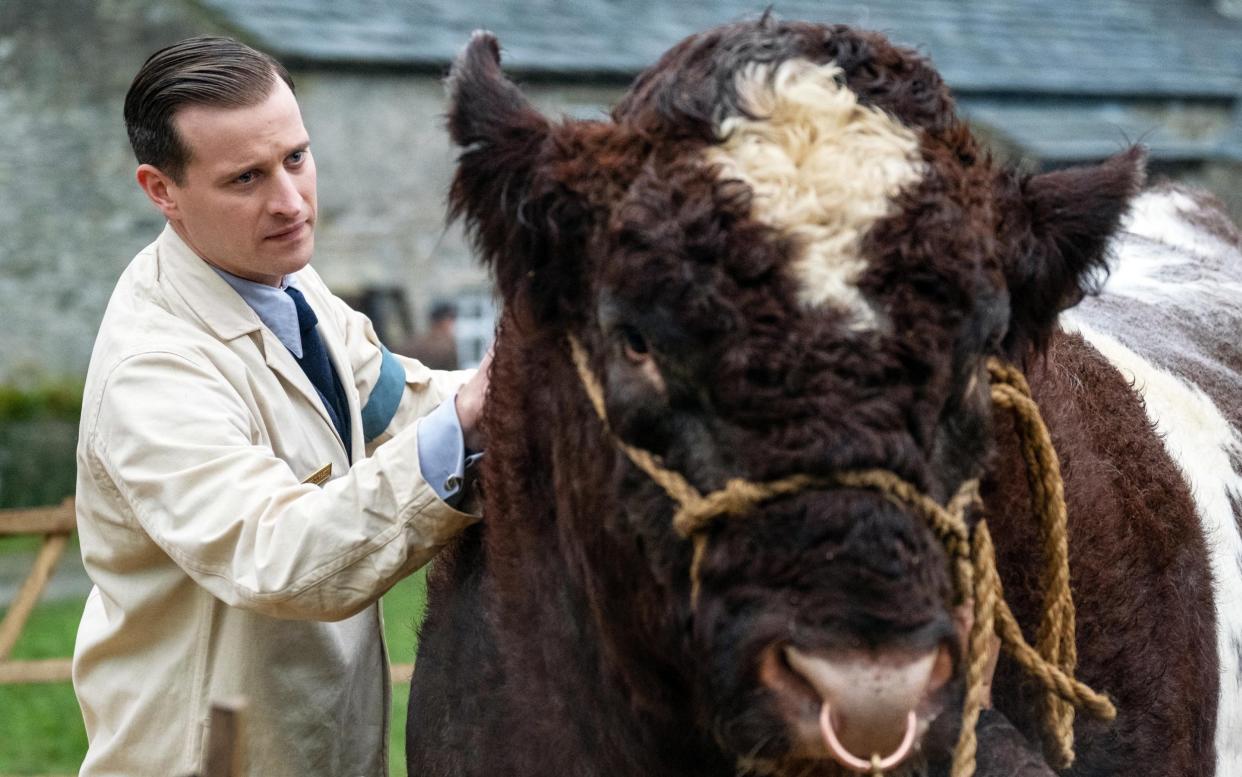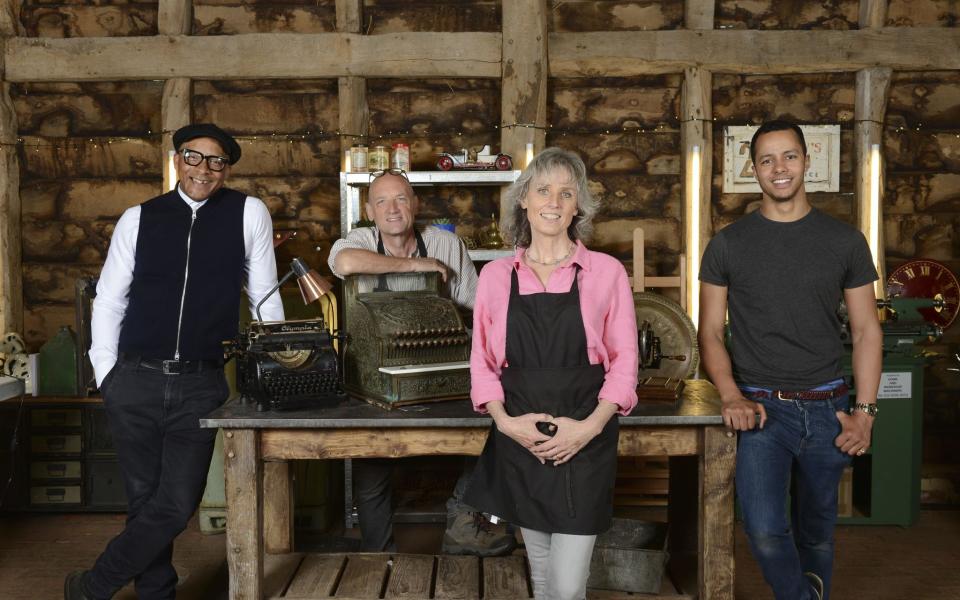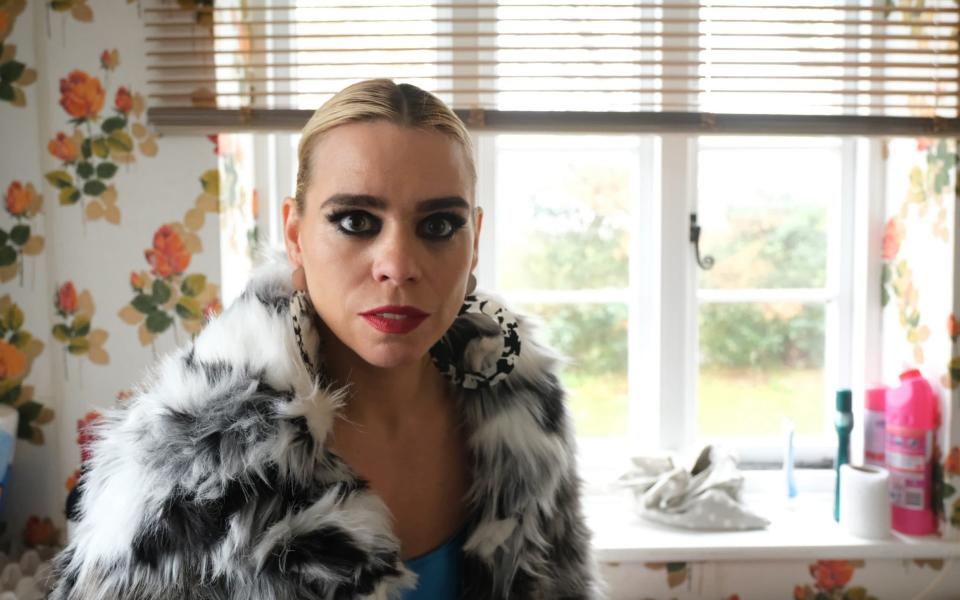From All Creatures to The Repair Shop: why British TV is soothing America's soul

- Oops!Something went wrong.Please try again later.
- Oops!Something went wrong.Please try again later.
- Oops!Something went wrong.Please try again later.
- Oops!Something went wrong.Please try again later.
When the Channel 5 reboot of All Creatures Great and Small was shown in the US earlier this year, it received almost universal critical acclaim. “In a TV universe where a dark tone and byzantine plotting are so often the default,” wrote Alan Sepinwall in a typical piece in Rolling Stone, “the empathy and simplicity of All Creatures feel genuinely radical.”
“Right off the bat, you have an idyllic, illustrated intro with some wind instruments there to let you know you’re in for some low-stakes, calming television,” wrote Alice Burton on Vulture.com, giving All Creatures five stars, as she raved about its loveable characters and picturesque setting in the Yorkshire Dales. The show, most agreed, was a bucolic medley of twee and tweed – and Americans couldn’t get enough.
All Creatures Great and Small, however, was just the latest British hit to take America by storm. It follows the success of Netflix’s The Crown, the BBC’s Poldark and a slew of gentle British factual entertainment programmes like The Great British Bake Off, The Great Pottery Throw Down and The Repair Shop.
Meanwhile BritBox, the streaming service for British TV set up by the BBC and ITV in 2017, has been going great guns. Subscriber numbers in North America have surged during the pandemic, rising to 1.5 million by October last year.
“Our viewers especially enjoy our original crime, mystery and drama premieres including A Confession, Honour, Pembrokeshire Murders, The Bay, and Traces, as well as new seasons of fan-favourites such as Father Brown, Vera, Death in Paradise, and Shakespeare & Hathaway,” says Emily Powers, BritBox’s Head in North America. “We also see a tremendous amount of engagement with the iconic classics such as the Agatha Christie collection, as well as beloved British comedies.”
In the main, British television seems to be acting as a soothing balm to American viewers who are tired – tired of both the preponderance of dark, complex US series, as well as tired of living through the pandemic.
“BritBox offers incredible series which are considered ‘escape viewing’,” says Powers. “Our favourite series are often cosy mysteries that provide familiar formats in beautiful countryside or tropical locations, which are enjoyable to watch and rewatch not only individually but also with spouses, kids, and loved ones who might be stuck at home together.”
Covid has given many Americans the opportunity to discover British television for the first time. “It can’t be overstated how much the pandemic allowed people to dive into things they might not otherwise watch,” says Maureen Ryan, contributing editor at Vanity Fair and a self-confessed Anglophile. “Thank you, Britain, for churning out this string of reassuringly formulaic (in a good way) reality TV that somehow restores shreds of faith in humanity at a very dark time.”
Of course, British TV has always enjoyed a certain cachet in the US, but for a long time “British TV” has meant period drama. “Crunchy gravel shows”, as they are known, from Brideshead Revisited to 2005’s Bleak House, have for decades been a mainstay of the “Masterpiece Theatre” channel over there. Americans can’t resist their lavish production values, stunning locations and loves that dare not speak their name.
“Any time you put anyone from the UK in a corset, side whiskers… whatever you do with those folks, if you put them in a country house we will watch it,” says Ryan. She cites the ongoing popularity of Downton Abbey in the US, with a second feature film now being made, as proof.

“It shows a sense of order – an idealised, unrealistic sense of order, of course, but it’s a sense of order. Even The Crown has that same sense. You have this steady rock, The Queen, at the centre of it, even if there’s chaos going on around her or people are unhappy. There’s a sense that we can aspire to some kind of order or predictability.”
Much British storytelling, both in television as well as literary fiction, is about that order being first broken then resolved. “I think that that’s just a thing that you find in British dramas, whether it’s crime, or The Crown, or even the Bake Off tent,” says Ryan.
It’s important to realise that most British television simply isn’t shown in America, which means that their idea of who we are and what we create is based on a limited sample.
“Those of us who are obsessed with all things British know that there’s plenty of trash on British TV too,” says Kristen Baldwin, TV critic for Entertainment Weekly. “Whether it’s Big Brother, or I’m a Celebrity... Get Me Out of Here or whatever… we don’t see it. What we see are the things like The Fall or I Hate Suzie that are so good.”
Baldwin says she feels like she has been screaming at people in reviews and in person to watch the latter. Shows such as Michaela Coel’s I May Destroy You and Phoebe Waller-Bridge’s Fleabag have already become hits, especially with a metropolitan audience. “I’m just speaking for my segment of America,” says Baldwin, “but we kind of view British people as just, like, smarter and more sophisticated. And everyone just seems cooler. Like on I May Destroy You – I would like to be friends with those people, but I’m not cool enough.”

As British TV has proved itself a marketable proposition, the money has followed, with lots of competitors eager to snap up British shows, from His Dark Materials on HBO to Harlots on Hulu. British TV also comes in more manageable doses. A standard US network season is 22 or 23 episodes long; Waller-Bridge made just 12 episodes of Fleabag in two series.
“It took America a long time to realise that seasons don’t have to be 22 episodes long,” says Baldwin. “You know, they can be six episodes and that’s certainly caught on more in America. Even broadcast networks now are doing shorter seasons. I think the shorter the seasons the higher the quality.”
“Right now, when everyone’s brains are very tired, shorter commitments are quite welcome,” says Ryan. “Smaller scale can help too – I’m not sure I want a massive epic in which I have to remember 200 names, histories, feuds. Sometimes a UK drama about one thing – Regency dandy wants love! Crime committed in small town! Let’s make pots – can be a real relief.”
And then there’s the accent. It seems remarkable that after 400 years of fraught bilateral history, not to mention a half century of watching each other’s television, America would still find our open vowel sounds endearing, but it is a fact.
“I am married to an Englishman,” says Ryan. “Thus for 20 years I have seen the phenomenon of ‘anything said with an English accent is automatically better’ happen whenever he interacts with Americans. It’s so weird but it’s a thing, and it makes so many UK dramas seem that bit better than they actually are.”

